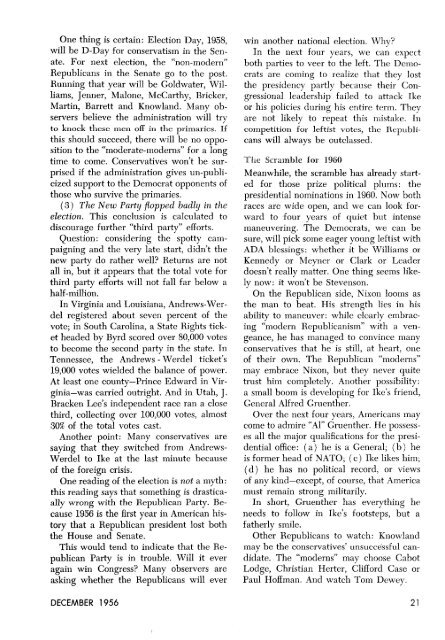Create successful ePaper yourself
Turn your PDF publications into a flip-book with our unique Google optimized e-Paper software.
One thing is certain: Election Day, 1958,<br />
will be D-Day for conservatism in the Senate.<br />
For next election, the "non-modern"<br />
Republicans in the Senate go to the post.<br />
Running that year will be Goldwater, Williams,<br />
Jenner, Malone, McCarthy, Bricker,<br />
Martin, Barrett and Knowland. Many observers<br />
believe the administration will try<br />
to knock these men off in the primaries. If<br />
this should succeed, there will be no opposition<br />
to the "moderate-moderns" for a long<br />
time to come. Conservatives won't be surprised<br />
if the administration gives un-publicized<br />
support to the Democrat opponents of<br />
those who survive the primaries.<br />
(3) The New Party flopped badly in the<br />
election. This conclusion is calculated to<br />
discourage further "third party" efforts.<br />
Question: considering the spotty campaigning<br />
and the very late start, didn't the<br />
new party do rather well? Returns are not<br />
all in, but it appears that the total vote for<br />
third party efforts will not fall far below a<br />
half-million.<br />
In Virginia and Louisiana, Andrews-Werdel<br />
registered about seven percent of the<br />
vote; in South Carolina, a State Rights ticket<br />
headed by Byrd scored over 80,000 votes<br />
to become the second party in the state. In<br />
Tennessee, the Andrews - Werdel ticket's<br />
19,000 votes wielded the balance of power.<br />
At least one county-Prince Edward in Virginia-was<br />
carried outright. And in Utah, J.<br />
Bracken Lee's independent race ran a close<br />
third, collecting over 100,000 votes, almost<br />
30% of the total votes cast.<br />
Another point: Many conservatives are<br />
saying that they switched from Andrews<br />
Werdel to Ike at the last minute because<br />
of the foreign crisis.<br />
One reading of the election is not a myth:<br />
this reading says that something is drasticaally<br />
wrong with the Republican Party. Because<br />
1956 is the first year in American history<br />
that a Republican president lost both<br />
the House and Senate.<br />
This would tend to indicate that the Republican<br />
Party is in trouble. Will it ever<br />
again win Congress? Many observers are<br />
asking whether the Republicans will ever<br />
DECEMBER 1956<br />
win another national election. Why?<br />
In the next four years, we can expect<br />
both parties to veer to the left. The Den10crats<br />
are coming to realize that they lost<br />
the presidency partly because their Congressional<br />
leadership failed to attack Ike<br />
or his policies during his entire term. They<br />
are not likely to repeat this mistake. In<br />
competition for leftist votes, the Republicans<br />
will always be outclassed.<br />
for 1960<br />
Meanwhile, the scramble has already started<br />
for those prize political plums: the<br />
presidential nominations in 1960. Now both<br />
races are wide open, and we can look for<br />
\vard to Ifour years of quiet but intense<br />
maneuvering. The Democrats, we can be<br />
sure, will pick some eager young leftist with<br />
ADA blessings: whether it be Williams or<br />
Kennedy or Meyner or Clark or Leader<br />
doesn't really matter. One thing seems likely<br />
now: it won't be Stevenson.<br />
On the Republican side, Nixon looms as<br />
the man to beat. His strength lies in his<br />
ability to maneuver: while clearly embracing<br />
"modern Republicanism" with a vengeance,<br />
he has managed to convince many<br />
conservatives that he is still, at heart, one<br />
of their own. The Republican "moderns"<br />
may en1brace Nixon, but they never quite<br />
trust him completely. Another possibility:<br />
a small boom is developing for Ike's friend,<br />
General Alfred Gruenther.<br />
Over the next four years, Americans may<br />
come to admire "AI" Gruenther. He possesses<br />
all the major qualifications for the presidential<br />
office: (a) he is a General; (b) he<br />
is former head of NATO; (c) Ike likes him;<br />
(d) he has no political record, or views<br />
of any kind-except, of course, that America<br />
must remain strong militarily.<br />
In short, Gruenther has everything he<br />
needs to follow in Ike's footsteps, but a<br />
fatherly smile.<br />
Other Republicans to watch: Knowland<br />
may be the conservatives' unsuccessful candidate.<br />
The "moderns" may choose Cabot<br />
Lodge, Christian Herter, Clifford Case or<br />
Paul Hoffman. And watch Tom Dewey.<br />
21
















